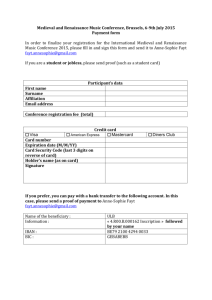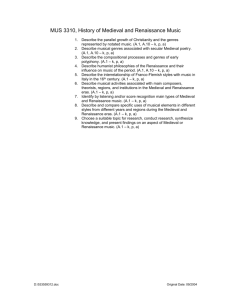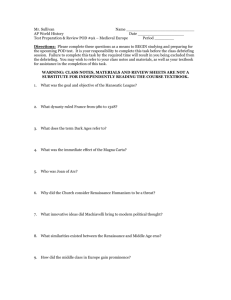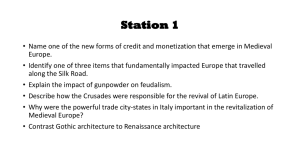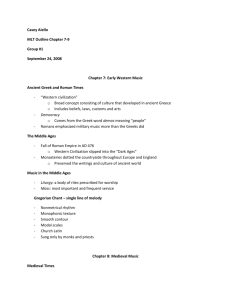AP syllabus 2014-15 - Highland Park High School
advertisement
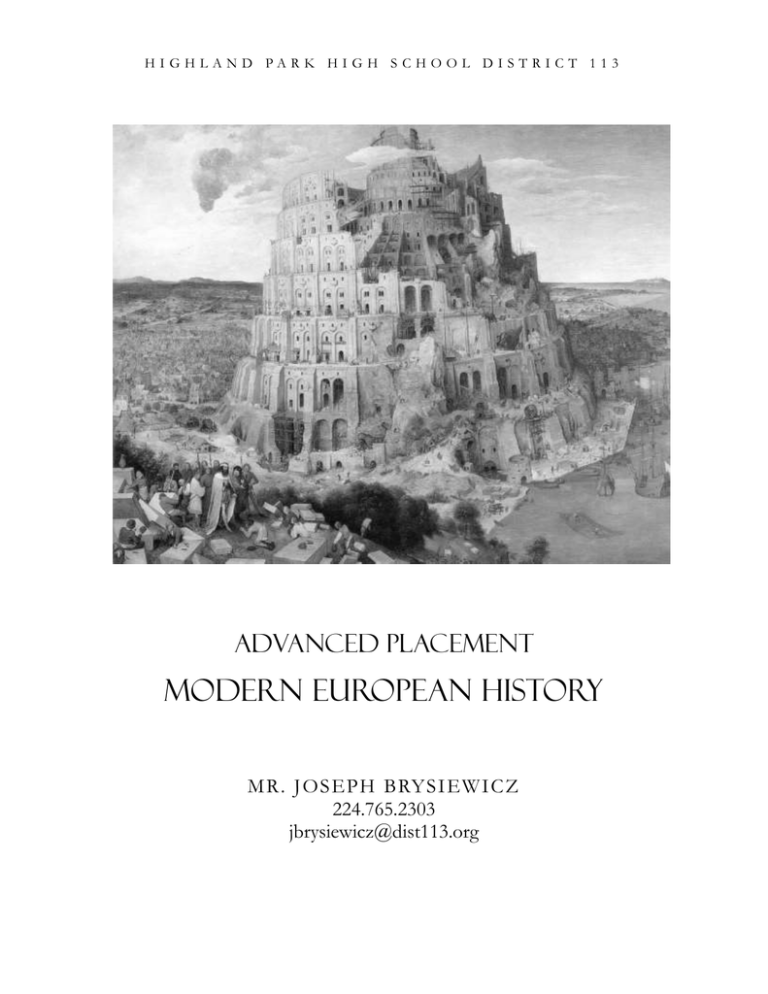
HI GHLAND PAR K HI GH S CHOOL DI ST RI CT 113 Advanced Placement Modern European History MR. JOSEPH BRYSIEWICZ 224.765.2303 jbrysiewicz@dist113.org C O U R S E D E S C R I P T I O N & TA RG E T S AP European History is a challenging course designed to be the equivalent of a freshman college Western Civilization survey course. The time period of study ranges from the late medieval period to the present day. Our class will cover all areas of European history, including social, political, economic, intellectual, and cultural history. Students should possess strong reading and writing skills and be willing to devote substantial time to both study and the completion of class assignments. Emphasis is placed on analytical writing, class discussion, use of primary sources, and critical reading. Students will engage in a variety of tasks such as debates, simulations, and creative projects all aimed at creating a deeper understanding of the material. Mastery of content is important, but of equal value are 1. Study and research skills 2. Critical reading of primary and secondary sources 3. Making historical analogies 4. Constructing and evaluating historical interpretations 5. Empathizing with the past (seeing another point-of-view) I think you will find these skills useful in college and later in life, regardless of your ultimate vocation. THE AP STUDENT Any AP class requires hard work and a commitment to intellectual growth. All students are strongly encouraged to dedicate themselves to the goals of AP European history and to take the AP exam at the end of the year. Motivation, good study habits, and a genuine interest in history will help make this a successful year for all of us. I hope that you will be rewarded with a sense of accomplishment and the belief that even a rigorous class can be enjoyable. E X P E C TA T I O N S F O R S U C C E S S Community Engagement & Projects: An AP class is a community formed around discovery and thinking in a specific academic area, but the strength of any community resides in our relationships. You should plan to be an active part of class throughout the year; your commitment to the work of our class discussions and projects will make the class more meaningful. Community engagement points include being on time and prepared for class (earns a C), interacting during class discussions and activities at least once a week (earns a B), and demonstrating intellectual risk-taking, resilience and resourcefulness (earns an A). Academic Dishonesty: Plagiarism, cheating, forgery and lying cannot be tolerated in a community of intellectual growth and inquiry. While our era of rapidly changing technology certainly provides new avenues and greater opportunity for plagiarism, it remains a serious academic and ethical offense. The road before you is littered with the remains of careers and reputations ruined by intellectual dishonesty. Any time you are having trouble with the class or are concerned about your progress or an assignment, please speak with me immediately. Help is available…always take the initiative to ask. Good luck and have a successful semester! General Classroom Behavior: As AP students, I have every expectation that you will work to make our intellectual community strong and vibrant. To this end, a few points: Always treat others the way the way they wish to be treated This class is our community: always be respectful of others’ opinions and ideas, even when you disagree. Everyone is here to learn and everyone is responsible for the learning that takes place, not just me. Please take this responsibility seriously Our community works best when everyone stretches themselves: take academic risks, ask questions, make mistakes, challenge yourself, and open your mind to different ideas and perspectives A T T E N DA N C E & H O M E WOR K & M I S S E D C L A S S /M A K E - U P WOR K Attendance and reading is of the utmost importance. Be in class on time ready to discuss. Turn in assignments and projects on time. Late work will be accepted within a few days of the deadline, with points lost in the community engagement category for each day late. Major projects/writing assignments lose one letter grade per day late. If you have an excused absence, do not contact the teacher—students miss class from time to time and you need not justify it to me. It is, however, your responsibility to get information from your student contacts on what you missed. I will always give extra handouts to students requesting them for an absent peer. You will have an extension on all work missed equal to the days missed. I understand that from time to time, every student’s schedule becomes difficult to manage. As a result, please speak with me if you are having difficulty finishing assignments; I am always willing to work with and support you. MATERIALS & TEXTS McKay, John P.; Hill, Bennett D.; and Buckler, John. A History of Western Society (8th Ed.). Houghton Mifflin Co., 2008. (Purchase at the bookstore) Perry, Marvin; Peden, Joseph R.; and Von Laue, Theodore H. Sources of the Western Tradition, Volumes 1 and 2. (7TH Ed.). Houghton Mifflin Co., 2008. (Class-provided) Your are required to purchase the following: 1. Dedicated notebook for class (this will be collected from time to time, so it should be used for AP Euro only). 2. A folder or binder to retain chapter notes, handouts, etc… 3. An end-of-year text for the last unit (this will be announced during the year). G R A D I N G W E I G H T S & C A T E G OR I E S Weights Semester Community Engagement: Projects (Recurring) 20% Reading: Reading Quizzes (Recurring) 10% Writing: FRQs/DBQ Essays (Occasional) 20% Content: Unit Tests (Approx. Monthly) 30% Summative: Semester Final 20% D I G I TA L D E V I C E S Chrome books and other digital devices will have a positive impact on your education and on the classroom learning community. These same tools can also be a source of distraction and aid in superficial thinking (as opposed to sustained, critical thinking). Recent research has shown that laptops in the classroom have great benefits, but also significant drawbacks if used incorrectly. (We will examine some of this research in the first weeks of class) As a result of this research, here are some general guidelines for our classroom regarding the use of chrome books in the classroom. -Chromebooks will be used at the teacher’s discretion to access course information (ABC-CLIO, scholarly websites, current events and educational websites), facilitate group work and individual inquiry, and to present information to peers in a paperless and dynamic way. -“Discussion Mode” Based on the research, a wide variety of activities in class do not make optimal use of laptops/digital devices—particularly student discussions, group textual analysis (close reading) and brief teacher lecture. In these cases, we will put devices in “discussion mode” (aka close the shell). -Similarly, notebook and pen are required for class every day; we will explicitly develop note-taking skills in a paper and pen medium (Smutko & Broaders) -Digital devices are to be put away until the teacher authorizes there use. Once we are done using a particular digital device the must be stored so as not to distract you from learning. -Students caught being off task with any digital device will jeopardize their community participation grade. If you show me you cannot discipline yourself towards using digital devices in a professional manner during times when we use technology in the classroom, then I will work with you to focus on the task. If, however, you find a digital device too distracting for our learning purposes, you may be issued alternative learning tools, such as a textbook, handout, or packet. This is not punitive, but rather a reminder to all of us that digital devices are tools, not the goal of education. SYLLABUS - THE MEDIEVAL AGE TO THE REFORMATION August 27- Dies Irae: The Medieval Mindset, the AP Mindset Europa Scavenger hunt, Book of Hours, Dies Irae 28- The Classical Crash Course I: Physis and Nomos and Nemesis oh my! Homework due- No Homework Ancient Greek Cheat Sheet Monotheism in a polytheistic world 29- The Classical Crash Course II: Platonic, Aristotelian, Judeo-Christian oh-my! Homework due- McKay, 371-380 (Reading Quiz) “How the Romans Became Italians” from Cahill – Summer Reading “Abelard & Aquinas” from Cahill – Summer Reading September 1- No School- Labor Day 2- Medieval Learning, Medieval Life: What the Hellas, an “Unmoved Mover”? Homework due- No McKay “City of God” Augustine of Hippo (Packet) “On the Misery of the Human Condition” Pope Innocent III (Packet) “On Love and Marriage” A Merchant of Paris (Packet) 3/4- Medieval World View: Abrahamic Solidarity & Anti-Semitism (Reading Quiz) Homework due- McKay, 381-386 “Dictatus Papae” Pope Gregory VII (Packet) “What is a scholar?” (Packet) Excerpt from Summa Theologica (Summer Reading Packet) 5- The Decline of Medieval Society (Reading Quiz) Homework- McKay, 390-401 “The City of Ladies” Christine de Pisan (Packet) “The Peasant Revolt of 1381” Sir John Froissart (Packet) “Defensor Pacis” (Defender of the Peace) Marsilius of Padua (Ht) 8- Birth of the Italian Renaissance (Classical & Medieval Quiz) Homework due- McKay, 412-420 “The Father of Humanism” Petrarch “Study of Greek Literature…” Leonardo Bruni “Oration on the Dignity of Man” Pico della Mirandola 9- The Flourishing City-State Homework due- McKay, 407-411 “The Prince” Niccolo Machiavelli 10/11- Renaissance Art & Science: Renaissance Art & Music Day Homework due- McKay, 421-427 12- Renaissance Politics & Religion (Reading Quiz) Homework due- McKay, 428-439 15- The Northern Renaissance Homework due- No McKay, “In Praise of Folly” Desiderius Erasmus (Ht) “Julius Excluded from Heaven” (Ht) “Celebration of the Worldly Life” Francois Rabelais (Ht) 16- The New Monarchy Homework due- Excerpt from The Civilization of the Renaissance in Italy: The Birth of Individualism by Jacob Burckhardt Excerpt from The Interpretation of the Renaissance: The Renaissance as a Transition from Medieval to Modern by Wallace E. Ferguson 17/18- The New Monarchy II Homework due- Abrahamic Faith & Anti-Semitism DBQ DUE Prepare for Medieval & Renaissance Test 19- How do we classify the Renaissance? Burkhardt v. Ferguson Homework due- Prepare for Medieval & Renaissance Test 22- Medieval, Italian & Northern Renaissance TEST & Review No homework due 23- Introduction to the Reformation Homework due-McKay, 387-389 & Jan Hus-391



